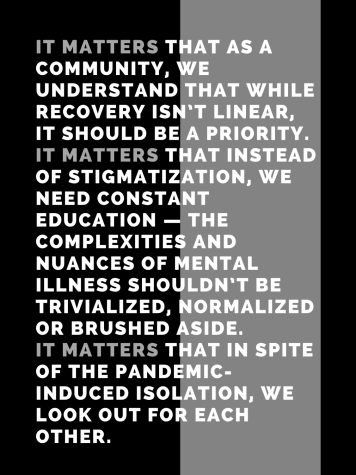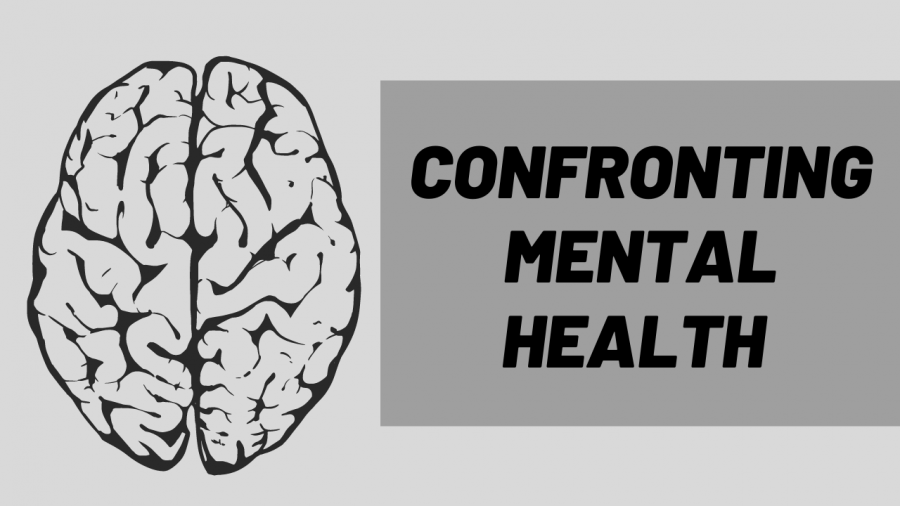Confronting mental health
Analyzing the ways in which the COVID-19 pandemic has led to deteriorating mental health
Analyzing the ways in which the COVID-19 pandemic has led to deteriorating mental health
October 16, 2020
We’re all far too familiar with that voice in our heads.
No, not the one that offers us optimism and confidence when we’re faced with a daunting task. The darker voice — the one that tells us that we’re not good enough, that we’re imposters undeserving of the successes that come our way, that we’re unworthy of love. Some days it takes center stage; other days, it’s invisible, so much so that we forget it even exists.
And in the midst of a global pandemic, this voice has seemingly amplified. We’re entering the eighth month of quarantine, and for many of us, thoughts of returning to “normal life” have almost ceased crossing our minds. The media labelling this time period as the “pandemic era” does nothing to alleviate the sense of hopelessness, nor does “pandemic fatigue” and people claiming to have given up on social distancing and mask-wearing. It feels as though there’s no end in sight — providing even more ammunition for that voice.
The voice also tends to exacerbate guilt — we stress out over deadlines and classes and the inconveniences of Zoom school, yet as we consume media about the mounting COVID-19 death tolls and the heightened stakes of the November election, we feel guilty. Guilty because the problems of online distance learning seem trivial compared to the chaos gripping the world. And the fact that many of us are privileged enough to, in a sense, forget about the chaos makes it all the worse. It’s easy to feel like our problems are irrelevant and undeserving of attention, and in turn, we stop prioritizing ourselves.
Yet, not doing anything about the voice makes its visits more frequent and pervasive. And with the fading connections with friends, it is no surprise that for many of us, the pandemic has fostered deteriorating mental health. With the CDC reporting that one in four young adults are facing mental health issues — three times higher than a year ago — the urgency to address mental illness is always rising.
Poor mental health is a universal problem; with online school and quarantine however, it is easy to isolate ourselves, and harder for others to notice. Not texting back for a while seems less unusual than being quieter than normal when sitting with your friend group at lunch. No longer demonstrating passion for your favorite activities is often dismissed or indiscernible, because the said activity has moved online and doesn’t feel the same or has been cancelled altogether. When bad days accumulate without anyone noticing, they seem to blend together — you stop taking care of yourself, stop getting enough sleep because being tired dulls the voice or stop taking much-needed breaks, because being busy drowns out the voice. The voice becomes perpetual to the extent where it feels normal.
More often than not, battling the voice is not a solitary task. However, reaching out for help feels far more one-sided; now, we have to recognize that the voice is a sign of declining mental health. Not only do we have to get past the scary hurdle of realizing that our emotional well-being is at jeopardy, but we also have to take concrete steps such as filling out the wellness check-in form or telling our friends or trusted adults about the voice. And when dealing with mental health is a seemingly more solo act — especially at the beginning, before you advocate for yourself and get help — it becomes harder to actually start.

Sometimes, the problem stretches beyond this, and becomes a professionally-diagnosed mental illness, supplemented by additional hurdles such as stigmatization and misconceptions. For instance, the U.S. Department of Mental Health & Human Services cites that a common myth among people is that therapy and self-help are a waste of time and medication is the only adequate solution, while in reality, different approaches work for different people, and often, a combination works best.
Taking complete charge of battling our own voices is challenging, but in a way, it accelerates our maturity. By taking accountability for our own mental health early on, we learn how to do so effectively, addressing unhealthy coping mechanisms and figuring what works best. After all, when we’re adults, no one is going to hand us the number to a therapist and drive us there — we have to do it ourselves. And beyond just that, recognizing our self-worth and understanding that advocating for our mental well-being is important.
Mental illness is not always visible — the voice persists despite outward smiles — and is not always diagnosed. But label or not, it matters. It matters that as a community, we understand that while recovery isn’t linear, it should be a priority. It matters that instead of stigmatization, we need constant education — the complexities and nuances of mental illness shouldn’t be trivialized, normalized or brushed aside. It matters that in spite of the pandemic-induced isolation, we look out for each other. Feeling alone seems far easier and frequent lately, but we need to lend support, perhaps offering to assist those struggling to reach out to someone better suited to help, while simultaneously making sure not to burn ourselves out.
Even though it may be hard, have the difficult conversation with your parents, confide in a sibling or friend, fill out that wellness check-in form and if needed, call hotlines for support. This pandemic has brought forth unparalleled challenges, as well as unparalleled amounts of resilience — but resilience doesn’t mean you have to do it alone. Being “strong” or “weak” are arbitrary labels, and in this respect, the biggest thing that matters is helping yourself and others. The voice’s perpetuity doesn’t mean confronting mental health is hopeless — it just means that coping, talking, understanding and learning how to make the voice recede is a perpetual task.
And yet, always remember that you deserve to be here and are loved more than you know — even on the days our voices convince us otherwise.
Note from the author: This editorial was completed on Wednesday, Oct. 14, and is not meant to be directly affiliated with recent community events — the goal of this piece is to serve as a reminder that mental health should always be a priority, especially in the light of the challenges brought forth by the COVID-19 pandemic.




























